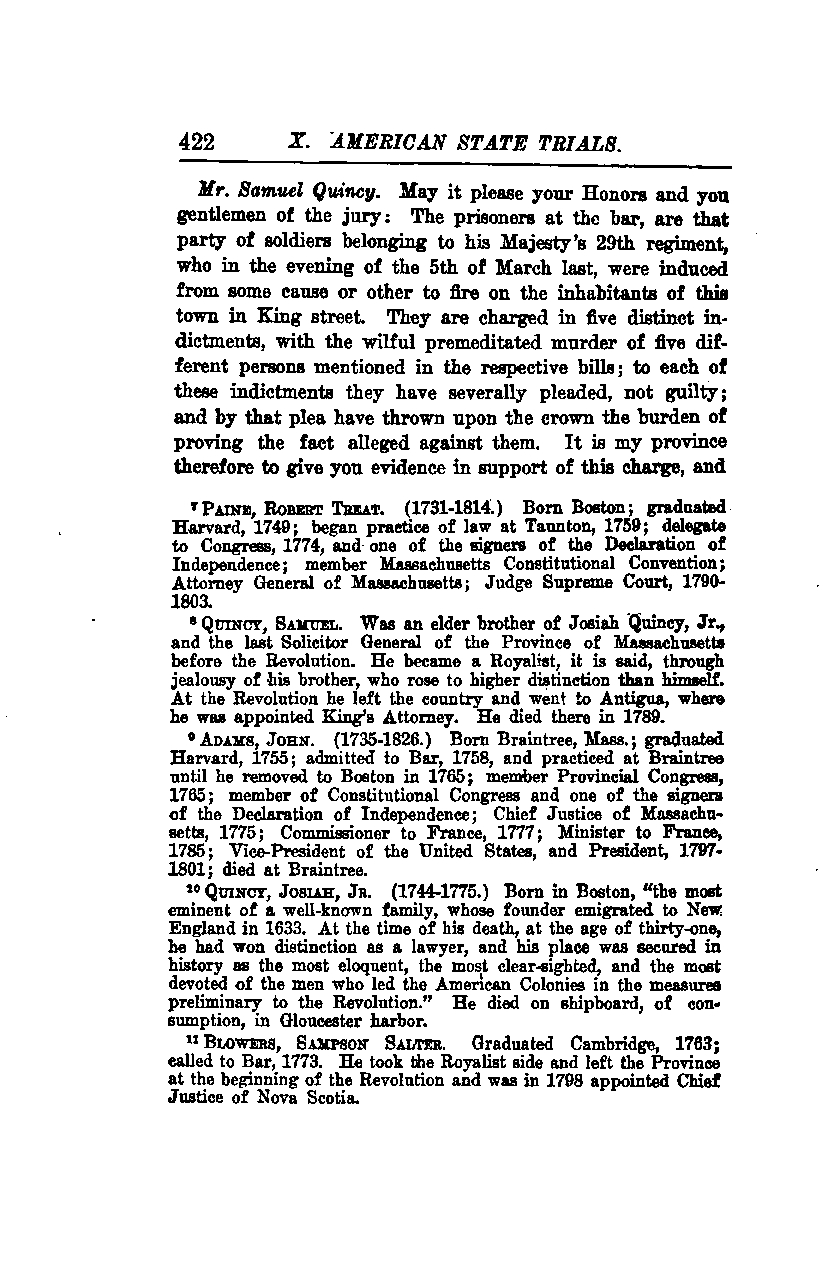
Here is the translated text as follows:
422 X. AMERICAN STATE TRIALS.
Mr. Samuel Quincy. May it please your Honors and you gentlemen of the jury: The prisoners at the bar are that party of soldiers belonging to His Majesty’s 29th regiment, who in the evening of the 5th of March last, were induced from some cause or other to fire on the inhabitants of this town in King Street. They are charged in five distinct indictments with the willful, premeditated murder of five different persons mentioned in the respective bills. To each of these indictments, they have severally pleaded not guilty, and by that plea have thrown upon the crown the burden of proving the fact alleged against them. It is my province, therefore, to give you evidence in support of this charge.
---
Biographical Notes:
**Robert Treat Paine (1731-1814):** Born in Boston; graduated from Harvard in 1749; began practicing law in Taunton in 1759; delegate to Congress in 1774, and one of the signers of the Declaration of Independence; member of the Massachusetts Constitutional Convention; Attorney General of Massachusetts; Judge of the Supreme Court from 1790 to 1803.
**Samuel Quincy:** Was an elder brother of Josiah Quincy, Jr., and the last Solicitor General of the Province of Massachusetts before the Revolution. He became a Royalist, it is said, through jealousy of his brother, who rose to higher distinction than himself. At the Revolution, he left the country and went to Antigua, where he was appointed King’s Attorney. He died there in 1789.
**John Adams (1735-1826):** Born in Braintree, Massachusetts; graduated from Harvard in 1755; admitted to the Bar in 1758, and practiced in Braintree until he removed to Boston in 1765; member of the Provincial Congress in 1765; member of the Constitutional Congress and one of the signers of the Declaration of Independence; Chief Justice of Massachusetts in 1775; Commissioner to France in 1777; Minister to France in 1785; Vice-President of the United States, and President from 1787 to 1801; died in Braintree.
**Josiah Quincy, Jr. (1744-1775):** Born in Boston, "the most eminent of a well-known family, whose founder emigrated to New England in 1633. At the time of his death, at the age of thirty-one, he had won distinction as a lawyer, and his place was secured in history as the most eloquent, the most clear-sighted, and the most devoted of the men who led the American Colonies in the measures preliminary to the Revolution." He died on shipboard, of consumption, in Gloucester harbor.
**Sampson Salter Blowers:** Graduated from Cambridge in 1763; called to the Bar in 1773. He took the Royalist side and left the Province at the beginning of the Revolution and was appointed Chief Justice of Nova Scotia in 1798.
---